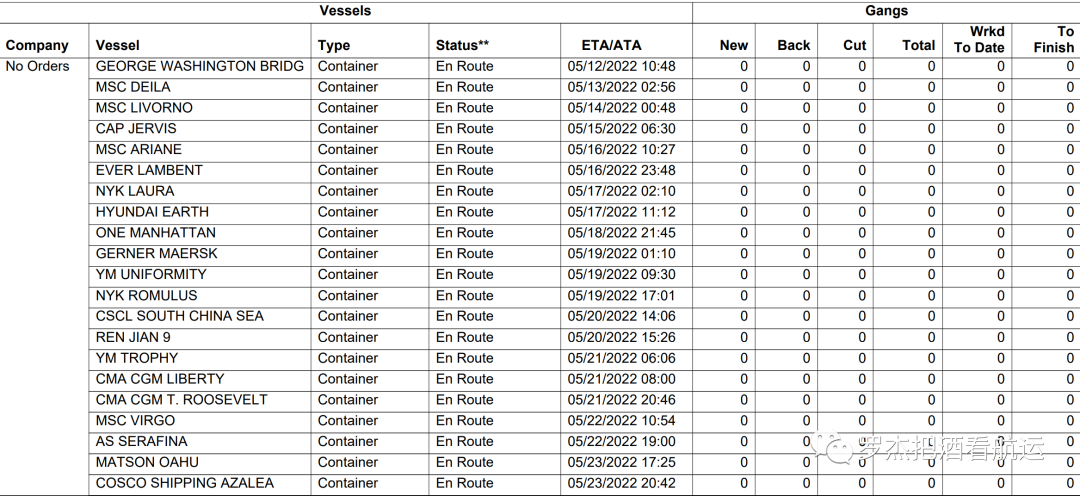1. Why stop the negotiation?
Public reports did not say why the union had called for a suspension of negotiations. The media asked the PMA representing the shipowner and the terminal. They kicked the ball back and asked everyone to ask the union (ILWU). The meaning is obvious: it’s not that we don’t talk about it, it’s that they (the union) don’t want to talk about it.
Saw reports today that it was determined that negotiations will be suspended from May 20 to June 1. However, the committees responsible for negotiating a specific issue, such as worker safety, are said to have continued to meet, and they were not completely torn apart.
2. What requirements did the trade union make this year?
The union is said to have prepared more than a dozen pages of grievances, apparently coming prepared. Some time ago, the Seattle docks awarded maintenance work to another union, IAM, on the first page. The jurisdiction of the type of work is always the most concerned issue of ILWU. Keep your own things, and try to get other people's things.
Regarding the wages of workers, I heard that the ship owner and the terminal are ready to accept a 10% increase. Personally, I think the demands of trade unions must be more than that. Sure enough, according to sources, the union has proposed that the PMA should cover the cost of assisted living for retired workers. I checked, and the cost of nursing homes in California is between $4,000-$6,000 per person per month, which is a huge amount, and the owner and the dock will not agree to it right away.
3. Is the union going to strike?
First of all, I want to clarify that the current labor contract prohibits labor unions from striking, so when others say that the wharf is about to go on strike, I know it well. However (this is a very important "but"), this does not mean that the union can not help. The premise of not being able to strike is that the contract is still valid. Once the contract expires, all restrictions naturally disappear. So, you might have guessed it. The union's strategy is to let contracts expire on July 1, after which they are free to act. This is a tactic used by unions and why they are in no rush to reach a deal so quickly. This time the trade union proposed a temporary adjournment. The reason behind it may also be to slow down the negotiation process until the contract expires, and then the two sides can fight freely. Workers can strike, and the wharf can also be locked out, preventing workers from entering the wharf for work.
4. Are unions about to start slowing down?
If you can't strike immediately, can the union slow down? Theoretically yes, but there is no indication that they are doing so. I looked at the total number of work shifts and the number of work shifts that were cut gangs per day from last week to this week, and there was no abnormality, which was within the normal range. In Los Angeles and Long Beach, the waiting time for work shifts has been stable recently, ranging from 3-4 days to 7-10 days. There has been a great improvement and there is no sign of deterioration.
The picture below is the list of ships waiting for the first shift (day shift) on May 24. The earliest CTA was in the tenth of May, which means that the ship that waited the longest was also 10 days ago, and the list was only half a page. A few months ago, the wait time for a shift was at least 20-30 days, and the list of ships was several pages long.
So, the pier has completely returned to normal, and has the timeliness improved? Not necessarily, I will write this question separately.

To sum up, although negotiations were suspended, terminal operations were not immediately affected. Stopping the negotiation is definitely not a good thing. Before, both parties showed goodwill and ensured that the containers would flow normally during the negotiation, and then this happened suddenly. Again, the negotiation thing is really hard to say. With the deepening of the negotiations, there are still many variables. It's far from the time when the two sides start to play hard, and in the words of Gene Seroka, executive director of the Los Angeles Piers, there's a lot to talk about, and we need to give both sides a space. At present, it may be wishful thinking for the two sides to reach an agreement quickly.
Previous:COSCO SHIPPING Ports acquired a 5% stake in Zeebrugge Terminal, and its shareholding ratio rose to 9
Next:These countries have lowered or exempted import tariffs on goods! Import tariffs on 6,195 items drop